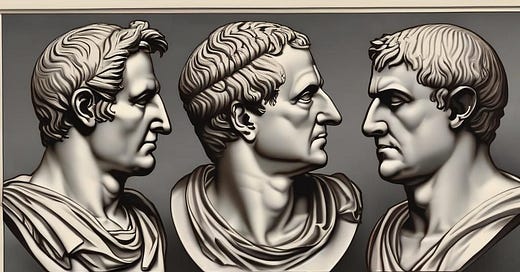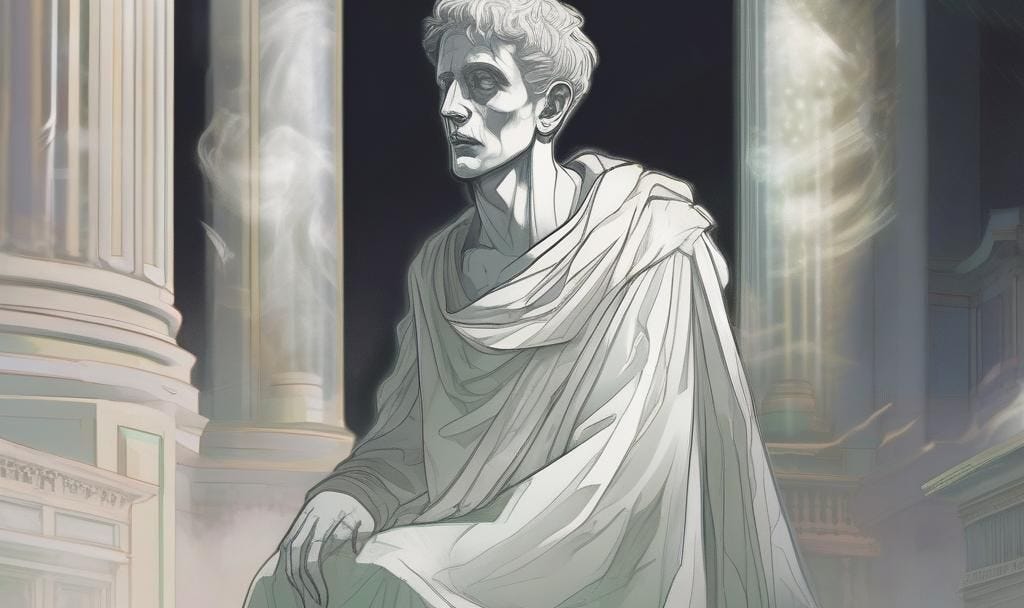My research has convinced me that Julius Caesar, as we think of him, is a myth, much like his doppelganger Jesus Christ, both royal claimants whose divine nature was revealed after they were betrayed by their followers and murdered. In the oldest histories, in both Greek and Latin, Julius Caesar appears as an afterthought or interpolation, as in Josephus’ Wars of the Jews where he receives only a paragraph amidst endless tales of Pompey.
Josephus additionally makes a peculiar claim: that Augustus reigned for 57 years, a figure disputed by Philo (who gives 43 years) and our own official timeline (which gives 40 years, 27 BC - 14 AD). Eusebius, whose first history of Christianity from the 4th century AD relies upon both Josephus and Philo, also invokes Josephus’ claim of a 57 year reign for Augustus. Compared to our official timeline, this either pushes the start of Augustus’ reign back to 44 BC or the end of it up to 31 AD. The former is the date of Caesar’s death and the latter is the middle of Jesus’s ministry.
The dating problem is well exemplified by Eusebius, who says Jesus was born “the forty-second year of the reign of Augustus” (Ecclesiastical History V). Official history says that Augustus only reigned for 40 years. Eusebius also says Jesus began preaching in the fifteenth year of Tiberius, citing Luke, who draws the figure from Marcion. Again, if Augustus reigned for 57 years and Jesus was born in the 42nd year, this means Eusebius thought Jesus was 30 years old when he began preaching. But this only works if you count the reign of Augustus as beginning around 43 BC.
In other words, Eusebius asserts in no uncertain terms that Jesus died between 75-76 years after the dawn of the Roman Empire (57 years of Augustus’ reign, ministry beginning 15th year of Tiberius at age 30, ministry lasting less than 4 years). On our official timeline, with the Empire beginning in 27 BC, this would push the death of Christ to 45-47 AD. Indeed, the gospel of John suggests Jesus was nearing 50 years old when he died, an age picked up and emphasized by church elder Irenaeus.
It seems Josephus counted the reign of Augustus from the death of Julius Caesar or shortly thereafter. What Josephus possibly suggests is that Julius Caesar never died, and that he himself was “Octavian” - the eighth (or seventh) Julius Caesar (compare to his uncle Sextus Julius Caesar, also betrayed and assassinated right before his nephew in Wars). When Julius Caesar was assassinated, Octavian took his name, becoming another Gaius Julius Caesar. As emperor, he became simply Augustus.
But Julius Caesar is poorly attested by Josephus, very briefly, and in a chronological reflection of Caligula himself. Wars says [Julius] Caesar reigned for 3 years, 7 months before being assassinated, while [Caligula] Caesar reigned 3 years, 8 months before the same. We even have Eusebius calculating the same reign for Jesus Christ, saying he ministered less than 4 years! The chronological discrepancy of ~17 years in Josephus actually allows us to align Christ and Caligula into the same person. For more on this thesis, see the first link in the trailers.
Eusebius argues, on the basis of Philo and Josephus, that the Jewish “nation” (which Philo boasts is wholly international) began to experience persecution during the time of Pilate. Unlike Philo and Wars, which show no awareness of Jesus Christ, Eusebius characterizes the persecution of the Jews as divine retribution for their persecution of Christ. He relies on Josephus to argue that their misfortunes were unceasing from the Alexandrian riots up until the Flavians conquered Jerusalem.
We can see that official Christian history completely depends on Philo’s letter Flaccus, which describes Caligula sending the King of the Jews (Agrippa) to visit Alexandria at the beginning of his reign, precipitating the riots. The oldest chronological piece come from Marcion (later copied by Luke), who says Jesus began preaching “In the fifteenth year of the reign of Tiberius Caesar”. And finally the gospel of John, as cited by Ireneaus, which implies Jesus was approaching 50 years old during his ministry. Is it possible Eusebius omitted 14 years from the life of Jesus, just as Philo omitted 14 years from the reign of the Caesars compared to Josephus?
Caligula (Gaius Caesar) is known as the great abuser of the Jews in Philo and thus too in Josephus and Eusebius. Philo repeatedly implies in Embassy to Gaius that Pilate and or Caligula deserve capital punishment - ie, crucifixion, for their lavish blasphemy against the Jewish law. Flaccus meets a similar end for similar reasons. We know that in the same timeframe and in much the same manner, Caligula and Jesus Christ were betrayed and murdered. 1 * 1 = ?
We can see that Julius Caesar is a scant reflection of Caligula in Josephus, and that Jesus Christ is a full blown reflection of Caligula in Mark. Mark continually declares that the lessons of heaven are not literal, but taught in parable so that their meaning is hidden. Mark is a parable of Roman authority impinging on Jewish beliefs. Pilate has no connection to Jesus Christ in Philo or Josephus’ Wars. Christ is not mentioned in those works at all! But the threat of capital punishment for blasphemy is.
Still, our mystery is not fully resolved, because there is another Julius Caesar, Constans I, who was anointed on December 25, 333 AD, and betrayed and murdered 17 years later.
Read more:
Caligula: Ghost of Christ and the Caesars
If we really want to understand the chronology of Christianity, we cannot begin with Paul, whose avowed foolishness and nonsense divorces itself from both wisdom and history. All the dating of Christianity and the origins of both Christ and Caesar can be traced to Philo, Marcion, and Irenaeus, with Josephus who throws a Julius shaped wrench into all of …
Livy Only Proves that Julius Caesar is Fake
Last week I published a thorough historiography of “Julius” Caesar, tracing the literary evolution of the title Caesar, the name Gaius, and the name Julius back through the ancient sources that shape their characters. One of the most surprising and fruitful discoveries came from Livy, a Latin author who is one of the founders of Roman history. Livy offe…






